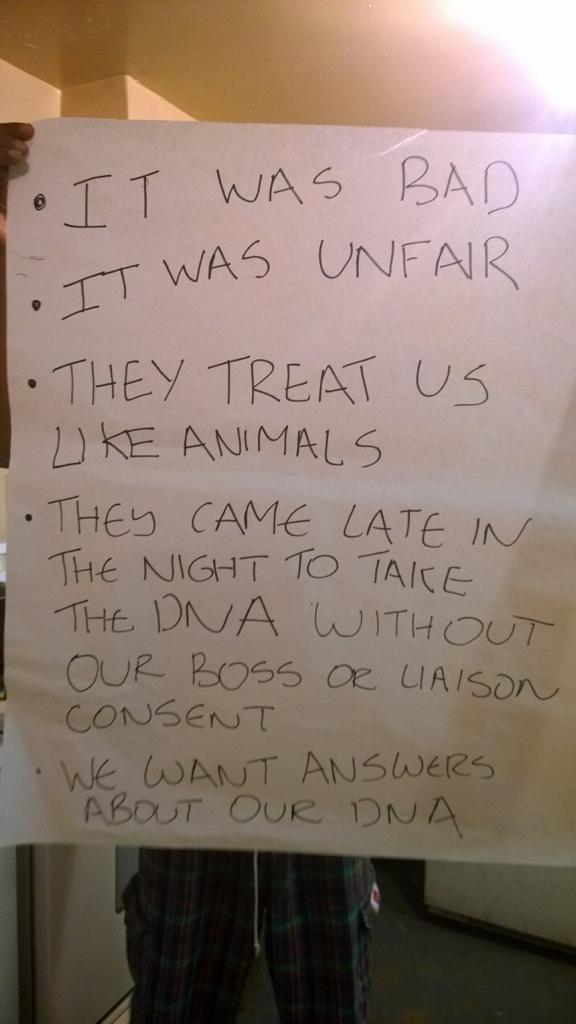A group of migrant farm workers has brought forward a racial discrimination case to the Ontario Human Rights Tribunal, with far-reaching implications for Canada’s temporary foreign worker program and immigration system.
At a virtual hearing on Monday, the lawyer representing 54 farm workers – all either from Jamaica or Trinidad – argued his clients were racially profiled by the Ontario Provincial Police (OPP) during an investigation in October of 2013 in Bayham, Ont.
During his opening statements, Shane Martinez said a “DNA sweep” was conducted in which DNA samples were collected from the farm workers en masse despite all fitting various physical descriptions that differed from how the witness had described the suspect. He said they were “targeted…in a way which discriminated against them because of their race, national or ethnic origin, citizenship and or colour, contrary to section one of the Human Rights Code.”
“Early on in that investigation, (OPP) received a very specific description of the suspect,” Martinez said. “However, despite this description, what unfolded was an investigation where all migrant farm workers were retargeted and treated as potential suspects.”
A suspect
The samples were collected during an investigation into a sexual assault that occurred in Elgin, near Bayham. The victim had described the assailant as “about six feet” but definitely taller than herself, according to Detective Superintendent Karen Gonneau’s testimony, who collected the samples at the time. She had also said he was muscular, had a low, raspy voice, was wearing a gray hoodie, workstyle pants and was brandishing a silver knife.
That suspect was eventually caught and sentenced to seven years on top of time served.
Still, Gonneau said, there was “nothing distinguishing or helpful” in the witness’ description.
During the hearing, it was heard the witness said that because he was Black, she thought he was a farm worker. Farm workers are regularly seen around that area.

During the investigation, the police collected samples from 96 farm workers in total, according to Chris Ramsaroop, from Justice for Migrant Workers, the organization that has helped advocate for the farm workers. He was also an observer at the hearing.
Martinez is basing his case on the fact that the witness description of the suspect, which included a police composite sketch portrait with an overall accuracy of seven out of 10, was ignored. Martinez says the evidence will “show a clear and systematic process” of racial profiling from the OPP against a “large group of people.”
“The evidence will show that race, colour, place of origin were clearly factors, if not the factors, in the adverse treatment,” he said concluding his opening statement. “That is the prima facie case.”
‘I was afraid’
During Monday’s hearing, Martinez repeatedly asked Gonneau why she hadn’t made any mention in her notes that there were any discrepancies or concerns about the reliability of the witness’ description of the suspect.
Gonneau insisted even though she understood traumatic experiences may affect people’s ability to recollect events, she just “wouldn’t” call it “unreliable.”
“I can’t think that I would ever put that in my notes or in a statement. It was more just a knowledge of, you know, what…the impacts (of trauma) could be here, but you work with what you have and try to move forward.”
The lawyer representing the OPP, Christopher Diana, said their job will be to show that the suspect description was, in fact, a “general description.” He says given the lack of any certain identification or description, the DNA canvas was not only consented to voluntarily by the farm workers but was “absolutely crucial.”
He stressed that it is important to view the case through the context of the “frailties of identification of evidence.”
“This is a context where there are few investigative leads…(and) a potential threat to other members of the public, and public safety is very much the legal issue before you,” he said during opening statements.
“There was a high quality criminal investigation with a successful result.”
Leon Logan, the main applicant among the 54 farm workers, testified during the hearing that he had consented to the DNA swab out of fears of losing his job and being sent back home. In an audio recording submitted as evidence and played at the hearing by Diana, Logan can be heard consenting to providing the sample.
At the hearing, Logan said he had concerns about the questions and about giving a DNA sample at the time but didn’t say anything “because (he) was afraid” of what his employer would do if he didn’t comply.
“I didn’t want to do [consent to give the sample],” he said during Diana’s cross examination. “I [consented] based on, if I didn’t do it, what will happen?…It seemed I didn’t have a choice.”
Precedent setting
While the case is about determining whether police racially profiled a group of workers, the decision and evidence that will come to light at the hearing will reverberate throughout the industry. Canada’s immigration system itself will come under scrutiny as the Seasonal Agricultural Worker Program (SAWP), a stream of the Foreign Worker Program, and aspects like closed work permits, are dissected.
“It’s one of the first cases to examine the intersection of policing and the plight of migrant workers in Canada,” Ramsaroop told NCM in a phone interview following the hearing.
“When we think about policing, and particularly racist policing, usually we consider this an urban phenomenon, and this case is going to highlight the particular vulnerabilities of racialized people…in rural communities.”
The “plight” of temporary foreign workers is nothing new, but it only comes on people’s radars sporadically, when the media focuses on some industry scandal.
But the slave-like conditions in which farm workers toil away with the hope of gaining permanent residence and/or reuniting with their families has been known to advocates and researchers for a long time.
The inherent power imbalance that exists between temporary workers and their employers is the reason many workers like Logan say they feel they have no choice but to accept precarious working and living conditions, low pay, exploitative employers and other abuses.
According to Dr. Jenna Hennebry, associate professor at Wilfried University and the expert witness at Monday’s hearing, foreign farm workers routinely accept exploitative working conditions due to fear of being repatriated and not being allowed back into the country to work. According to her research, which includes a survey of 600 farm workers, 44.5 per cent responded that they would go to work despite being ill for fear of being terminated.
“The idea is that you can’t say no to an employer, you can’t walk away, you can’t assert rights with an employer because of that power imbalance – whether it’s to seek legal advice, or whether it’s to seek medical care or whether it’s to refuse a DNA sample,” Hennebry said during Diana’s cross examination.
“It’s a similar scenario, because in all of those areas, if the worker chooses not to do so, the program enables the employers to terminate employment.”
Developed trust
At the hearing, Diana suggested to Logan that the idea that he and the other farm workers had been discriminated against had been suggested to him by Ramsaroop first.
“Is it fair to say that, up to that point, you didn’t have any concerns at all?” Diana asks.
“I had concerns about it,” Logan answered. “I feel away.”
After the hearing, Ramsaroop told NCM many of the workers involved in the case knew him personally because, for the “last couple of years,” he had been visiting the farms on the weekends. They developed trust, he says.
That’s what prompted some workers to take him aside the weekend after the OPP had done the DNA sweep to tell him about it.
“When the workers met with us, they were angry, they were humiliated, they were embarrassed this had happened to them,” he says.
“They wanted this addressed. They wanted the people who did this to be held accountable.”
Ramsaroop says he hopes the case will help make the issue more prominent in Canadians’ minds, particularly if the opportunity to ramp up organizing and the mobilization of workers can be seized.
“It’s part of a larger puzzle. It’s part of a larger picture of different forms of organizing, of adding advocacy, pushing the envelope. So, we have to look at this court case as advancing one component of this larger struggle.”
The hearing is expected to take about seven days.
Fernando Arce is a Toronto-based independent journalist originally from Ecuador. He is a co-founder and editor of The Grind, a free local news and arts print publication, as well as an NCM-CAJ member and mentor. He writes in English and Spanish, and has reported from various locations across Canada, Ecuador and Venezuela. While his work in journalism is dedicated to democratizing information and making it accessible across the board, he spends most of his free time hiking with his three huskies: Aquiles, Picasso and Iris. He has a BA in Political Science from York University and an MA in Journalism from Western University.





